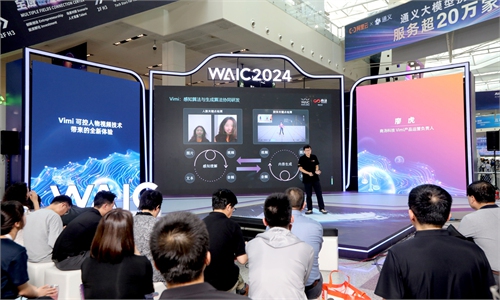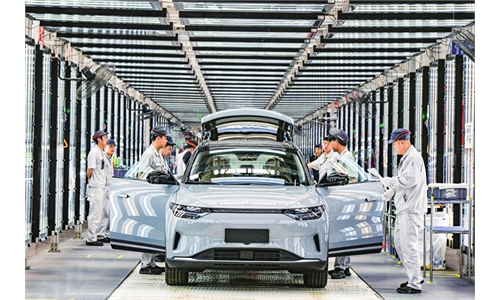
Illustration: Liu Xiangya/GT
China's exports in June rose by an impressive 8.6 percent from a year earlier to reach $307.85 billion, beating the 7.6 percent increase seen in May, the General Administration of Customs (GAC) said on Friday. The improvement in foreign trade is a testament to China's rising comparative advantages in manufacturing across the low-, middle- and high-end segments, as well as the resilience of China's industrial ecosystem, with its strong and globally unrivalled supply chain as its distinctive hallmark.However, the US and some of its close allies have been trying to stymie the growth of Chinese exports in their reckless attempt to contain China's rise. After putting in place sweeping sanctioning measures targeting Huawei Technologies and a range of other technology companies, restricting imports of Chinese-made batteries, solar panels, steel and other goods, the US and the EU have lately announced levying extra tariffs on Chinese electric vehicles.
In addition to imposition of extra import duties, the US has purposefully taken issue with China's new-energy sector "overcapacity" to muddy the waters even further. China's innovative new-energy products are being embraced by the global market, which is clear for all to see. China's electric vehicle exports to Asia alone have witnessed a consistent surge, growing by 68 percent to reach $4.2 billion in the first four months this year compared with a year earlier. The fact is that the EVs are in great demand in many countries, rendering the "overcapacity" talk an untenable hypothesis.
In the coming months, Chinese-made manufactured high-tech products to the US and some Western countries in Europe will be curtailed by the high tariffs, but the competitiveness of Chinese manufacturers cannot be dented, and the country's exports will continue to be very competitive.
China's rapid advancement in technology innovation, no matter it is Huawei's 5G gear, CRRC's high-speed rolling stock, BYD and Nio's electric cars, DJI's drones, Jinko's solar panels and Envision's wind turbines, will continue to be embraced by the Global South, as they are adopting inexpensive Chinese technology to develop their own economy and enrich themselves. And, China will always stand behind the Global South countries to support their pursuit for prosperity and get rid of stark poverty.
By refusing Chinese high-tech goods through levying the exorbitant tariffs, the US and its close allies will gradually feel the pinch. Their anti-China economic policies will inevitably backfire. The ordinary consumers in those countries will have to face much higher EV prices and energy cost because of their government's assault on Chinese products, and these countries' green transition will be significantly weakened. Now, economists say that a country's future and people's welfare are increasingly tethered to the speed of its green transition.
China is expected to adopt even bolder measures to consolidate a leading global role in phasing out carbon-powered "old energy" and gasoline-fired cars by rapidly adopting new energies, consisting of solar panels, hydropower, wind turbines, EVs and other energy products. China's market size will decide its green transition will be epoch-making, and produce exemplary ripple effect on the globe.
Domestically, China will continue to accelerate supportive government policies to propel infrastructure, large-scale equipment trade-ins, and property destocking to cut redundancy and sharpen its all-round competitiveness in the world. Externally, the country is expected to open wider to all foreign partners, and align more closely with its neighbors and the Global South countries, assisting them to prosper together with China.
Over the past 20 or so years, China has gradually accumulated an increased range of comparative advantages in productivity of its workforce, the quality of its infrastructure, the integrality of its industrial ecosystem, and the might of its manufacturing size. All this has significantly contributed to the formation of China-centered industry and supply chain.
And, the tenacity of China's industrial ecosystem will constantly strengthen as the country has just set on a new development paradigm - to shore up new quality productive forces spearheaded by scientific research and technology innovation.
This policy framework will guide China's development in the next decade and beyond and is expected to fortify and increase the country's industrial capability among major economies. A basket of emerging technologies - 5.5G and 6G internet connection, AI, robotics and quantum computing and the across-the-board technology-manufacturing synergy, plus China's enormous labor pool and globally advanced infrastructure, will ensure the country to stay ahead in the next-stage industrial competition.
China's future exports will be underpinned by sustained technology innovation and the ongoing manufacturing sector rejuvenation and broad-based upgrade. The goal is to make the country an unshakable source of incremental growth that the world's business conglomerates cannot ignore despite Washington's "de-coupling" bid. As the world's comparative advantages in manufacturing have shifted eastward, the US and its allies will do their utmost to thwart and hold back the shift.
Some analysts claim that China is currently very competitive across the low-value, middle-value and high-value industrial sectors, so it is natural for the country to keep moving up on the global value chain ladder. Although other sectors, such as agriculture and services, are also important and deserve more government inputs, the policy on resolutely beefing up scientific research and new technology innovation, and maintaining a large, strong and modern manufacturing economy should not change, which will put in place the bedrock for the sustainability of the growth of exports in the coming years.
The author is an editor with the Global Times. bizopinion@globaltimes.com.cn



